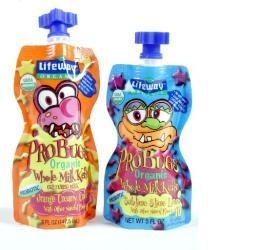The original observation of the positive role of these bacteria can be credited to the pioneering work of Metchnikoff in the early 1900s, who suggested that these beneficial bacteria could be administered with a view to replacing harmful microbes with useful ones. The term "probiotic" meaning 'for life' was first coined in the 1960s by Lilly and Stillwell. Probiotics were defined as microorganisms proven to exert health-promoting influences in humans and animals. Probiotics were recently redefined by an expert group to be 'live microorganisms which when administered in adequate amounts confer a health benefit on the host'.
Organisms used as Probiotics
Two main genera of Gram-positive bacteria, Lactobacillus and Bifidobacterium, are used extensively as probiotics. However, while other probiotics such as Escherichia, Enterococcus and Saccharomyces are also available in the market, their safety remains an area of concern.
Benefits of Probiotic
- People use probiotics to prevent diarrhea caused by antibiotics. Antibiotics kill "good" (beneficial) bacteria along with the bacteria that cause illness. A decrease in beneficial bacteria may lead to diarrhea. Taking probiotic supplements (as capsules, powder, or liquid extract) may help replace the lost beneficial bacteria and thus help prevent diarrhea. A decrease in beneficial bacteria may also lead to development of other infections, such as vaginal yeast and urinary tract infections, and symptoms such as diarrhea from intestinal illnesses
- Helps to reduce Inflammation of the ileal pouch (pouchitis) that may occur in people who have had surgery to remove the colon.
- Help prevent infections in the digestive tract.
- Help control immune response (inflammation), as in inflammatory bowel disease (IBD), colon cancer, and irritable bowel syndrome (IBS).
Are probiotics safe?
Probiotic bacteria are already part of the normal digestive system and are considered safe. The U.S. Food and Drug Administration (FDA) does not regulate dietary supplements in the same way it regulates medication. A dietary supplement can be sold with limited or no research on how well it works or on its safety.
Conclusion
Literature on the role of probiotics in the treatment of pouchitis is still regarded as limited although small controlled trials have suggested that at least one probiotic preparation (VSL#3) containing 5 x 10 per gram of four strains of Lactobacilli , three strains of Bifidobacteria and one strain of Streptococcus salivarius subspecies thermophilus may be effective in the prevention of pouchitis.
Source:Google


4 comments:
this articles nice three words for it - fab-uo-lous!!!!!!!!!!!!!!
keep it up!!!!!
Hi Shibani
Thanks for appreciating article...
Thanks for visiting my site: http://jmorrow50.wordpress.com. I've read many of your articles and find your posts to be both very interesting and insightful. In the U.S., Danon is making some pretty strong marketing claims on its yogurt products. What are your thoughts on Bifidus Regularis?
Hi Dr Jarret!
Thank you for visiting my blog...well regarding Bifidus Regularis has been proven to exert a number of dramatic effects on the intestinal tract including improved transit time as well as protection of the gut from colonization by harmful bacteria.I think its effective Probiotic.
Post a Comment